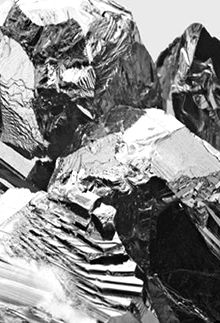Rare earth site set for WA
 A remote WA town is pushing to build a multi-million-dollar processing plant that Malaysia wants banned.
A remote WA town is pushing to build a multi-million-dollar processing plant that Malaysia wants banned.
Lynas Corporation produces rare earth minerals at Mount Weld in WA's northern Goldfields and ships them to Malaysia for processing.
However, part of the processing involves the cracking and leaching of the materials, which creates low-level radioactive waste. This waste has been the subject of controversy and protests in Malaysia.
The Malaysian Government recently renewed Lynas's operating licence on the condition that the company build a cracking and leaching plant elsewhere by mid-2023.
It has also banned the company from importing materials containing radioactive materials, which Lynas wants in Malaysia for later stages of its processing.
The City of Kalgoorlie-Boulder has pursued the company and convinced it to move to the region.
Kalgoorlie-Boulder CEO John Walker says the plant could be a “game changer”, diversifying the local economy and helping it rely less on gold mining.
Lynas says it would use a residential workforce instead of fly-in fly-out workers, creating about 500 jobs in the construction phase and about 100 permanent roles.
“For a global company with a global product in rare earths, I think it's the start of something that will be really great for the town,” Mr Walker has told reporters.
“Obviously it creates jobs, long-term employment, different skills so we broaden the base of the people that want to be here and the residential-based employment.”
Construction will cost between $250 million and $500 million, and should begin within months.
It has been pushed through a streamlined approvals process, receiving formal support from the State and Federal governments.
The project was granted the Commonwealth's major project status due to a deal signed last year between Australia and the United States to boost critical mineral production, including rare earths.
The countries want more access to supplies that are not produced in Chine, which is currently responsible for most of the world's rare earths.
Lynas has also secured a contract to design a rare earths processing facility in Texas to supply the US Department of Defense.
The company insists that safety concerns raised in Malaysia are political and not based on science.
Lynas says it has conducted several scientific reviews, and the International Atomic Energy Agency (IAEA) has deemed the residue risk to the public and environment as “intrinsically low”.In fact, the company insists the radioactivity is so low that it does not even have to be labelled as radioactive when being transported.
Some local opponents agree that the radioactivity is low, but they warn that the specific types of radioactive components could become aerosolised.
“The waste will be stockpiled somewhere around Kalgoorlie,” WA Mining and Pastoral Region MP Robin Chapple has told the ABC.
“That is problematic because it's very fine, it is friable material, it can become aerosolised, it can get into the atmosphere and anyone who inhales or ingests this sort of material is at risk.”
Associate professor in chemical and environmental engineering at RMIT University, Gavin Mudd, says Australia does not currently have any of the type of plant and waste storage required.
However, he believes the project could “meet a lot of the environmental standards that the community would expect” if stringent measures are taken.
“We need to make sure we're addressing things such as air quality, and not just for the normal sort of pollutants or contaminants … we also have to consider the radioactive nature of the minerals that are being processed,” he said.
“Make sure the technology, the pollution control within the processing plant and the overall environmental management achieves the sort of standards the community expects and that a facility would be legally bound to abide by.”
The federal Department of Industry, Science, Energy and Resources says the Kalgoorlie project will fall under several government regulations and development controls.
“These controls are established to serve the public interest by delivering desirable regulatory outcomes which include protecting the public from health and safety risks and managing environmental, social and other development-related impacts that may arise from a project,” the department said.
Associate Professor Mudd said the waste site would require long-term monitoring, as much of the waste will remain dangerous “in perpetuity”.
Lynas says the plant’s waste “will be stored in approved, purpose-built long-term storage facilities”, but has not revealed a location.
The company says it is “continuing to investigate offsite disposal options (including returning iron phosphate to Mt Weld) as well as re-use opportunities of iron phosphate as a soil conditioner”.
More details should be released publicly when confirmed.







 Print
Print